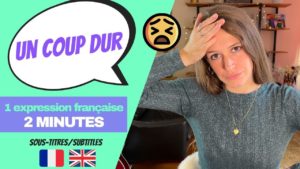News of the week:
- Chloroquine: a first step towards curing coronavirus. [spp-timestamp time="00:00:38″]
- Covid-19 symptoms: loss of sense of smell added to the list[spp-timestamp time="00:01:36″]
- The situation is becoming increasingly dramatic in Italy with 800 deaths in 24 hours this Saturday.[spp-timestamp time="00:02:00″]
- Coronavirus epidemic: an update on postponed or cancelled sporting and cultural events.[spp-timestamp time="00:03:10″]
- Explanation of the week's vocabulary [spp-timestamp time="00:05:06″]
Quiz: did you understand everything?
Test your understanding of French! Listen to the episode and take the quiz to see if you understood everything.
Transcription
Welcome to HelloFrench's press review, the podcast that immerses you in the news of the week, to help you improve your French.
On the front page for this week of March 15-21, 2020:
- A first lead to treat the coronavirus: chloroquine.
- Symptoms of Covid-19: loss of smell is another one.
- The situation is becoming more and more dramatic in Italy with 800 deaths in 24 hours this Saturday.
- Coronavirus outbreak: an update on postponed or cancelled sports and cultural events.
What if chloroquine, a drug usually used to combat [tooltips keyword="malaria" content="malaria"], were the solution to Covid-19? That's what Didier Raoult, a doctor from Marseilles, claims. In a study he carried out on 24 patients, 75 % of them saw the virus [tooltips keyword="complètement " content="totally"] disappear after six days. In a second group of patients who did not take the drug, only 10 % no longer carried the virus. This treatment will now be tested on a larger scale, the French government has announced. French pharmaceutical company Sanofi has announced that it will be offering doses of the anti-malarial drug Plaquenil, which could help [tooltips keyword="soigner " content="to treat"] 300,000 patients. Caution is still called for in the face of this [tooltips keyword="remède " content="cure"] miracle. Indeed, Chinese doctors had already considered this avenue before abandoning it. Only trials on a larger scale [tooltips keyword="grande échelle" content="in large scales"] will really enable us to [tooltips keyword="attester" content="certify"] its effectiveness.
[tooltips keyword="Fièvre " content="fever"], [tooltips keyword="toux " content="cough"] dryness and breathing difficulties. Until now, these three symptoms have been the main signs of a Covid-19 infection. Doctors have now added a new symptom to this list: the loss of [tooltips keyword="odor" content="smell"]. A momentary loss of sense of smell has been observed in younger patients, aged between 23 and 45, without them having [tooltips keyword="nez bouché" content="blocked nose"].
The situation in Italy is becoming increasingly dramatic, despite total containment. Every day, the number of deaths due to the coronavirus continues to rise, with 430 deaths on Thursday, 600 on Friday and 800 recorded this Saturday. An even more radical decision was therefore taken by the Italian government this Saturday evening, in a further attempt to reduce the [tooltips keyword="propagation" content="spread"] of the virus. The country is closing all its factories from March 22 to April 3. A very difficult decision, from an economic point of view, for Gisueppe Conte, the Italian Prime Minister. He described the current situation as "the most serious crisis the country has experienced since the Second World War". Only factories essential to the supply of essential goods for the population are now open. Pharmacies, supermarkets, banks and public transport remain open for the time being. Since the beginning of the epidemic, more than 5,000 Italians have lost their lives and 3,000 people are currently in [tooltips keyword="intensive care" content="intensive care"].
In the wake of the coronavirus epidemic, numerous events around the world have been preventively cancelled. The worlds of sport and culture are particularly affected by these [tooltips keyword="cancellations " content="cancellations"].
In soccer, the 2020 European Cup will finally take place from June 11 to July 11, 2021. As planned, the [tooltips keyword="competition" content="league, championship"] will be held in 12 different countries. The Champions League and Europa League have been suspended for the time being. However, UEFA plans to have teams play matches on weekends to complete the [tooltips keyword="championnat " content="league, championship "] by June 30. National championships are also suspended for the time being in many countries, including France, Italy, Spain, Germany, Portugal, Brazil and Mexico.
In tennis, the season is currently suspended until June 7. The French Open has already been postponed to the fall.
In basketball, the NBA has also been suspended until further notice.
For the time being, the Tokyo Olympic Games remain on schedule, although many sportsmen and women, including the American Athletics Federation, are calling for a [tooltips keyword="report " content="the delay, the postponement"]. The Tour de France, scheduled to start on June 27, also remains on schedule, despite the threat of cancellation.
In the world of cinema, the Cannes Film Festival, which usually takes place in May, has already announced its postponement, probably to June or July. A first. Eurovision, which was due to take place in Rotterdam in May, has been cancelled. No postponement date has yet been announced. Numerous films have also [tooltips keyword="décalé" content= " to shift something, to postpone something " ] their release due to the epidemic: the latest James Bond film, Mulan or Fast&Furious 9. Numerous museums and monuments also remain closed to enforce confinement in the various countries where it has been imposed. These include the Louvre, the Eiffel Tower, the Great Wall of China and Saint Peter's Basilica in Rome.
Vocabulary of the week
Enrich your French vocabulary, download our list of key words for the week of March 15-21, 2020.
■ Malaria: a tropical disease that is transmitted by an insect, when certain mosquitoes bite us.
■ The solution: the answer to a problem, an idea or something that allows us to overcome a difficulty.
■ To heal (verb): to bring a care, to help to cure, to try to make disappear a disease.
■ Completely (adverb): totally, entirely.
■ Medication: a substance, something we take to treat ourselves, a remedy to try to cure a disease.
■ Treatment: all the medications and things a patient is told to do to get better. Everything that will help to treat a patient.
■ Dose: the amount of a medicine. The proper portion of something.
■ Caution: Caution is an attitude. It is the fact of being careful, of thinking about what could happen.
■ The miracle cure: a cure is a medicine or something that is used to heal. When we talk about a miracle remedy, we are talking about a magic medicine, which would be extraordinary, which would cure the sick very easily.
■ Large-scale: large, over more people or over a larger area. For example, "This drug worked on two patients. Now let's do a large-scale test on 1,000 patients."
■ To attest (verb): to assure, to certify something thanks to a proof or thanks to a testimony.
■ Effectiveness: very good performance. When we say that something is effective or has demonstrated effectiveness, it means, "It worked very well." It can also be used for a person. When someone is said to act efficiently, he or she acted without wasting time and quickly achieved the result that was expected.
■ Fever: when someone's temperature is higher than normal. For example, "He has a high fever, his temperature has risen to 39 degrees."
■ Coughing: we expel air from our lungs by making a lot of noises. This is when our airways, our bronchial tubes, are irritated and we exhale with a lot of noise. Generally, it happens when we are sick or when we have swallowed wrong.
■ The symptom: it is the way in which a disease will show itself, manifest itself. It is thanks to a symptom that we can discover that we have a disease.
■ Smell: This is a sense. It allows us to smell odors with our nose.
■ To block (verb), blocked nose: something prevents the passage, it is obstructed. For example, "My nose is blocked, I can't breathe. I have to blow my nose."
■ To decrease: to make smaller, to make less big.
■ Propagation: the fact of spreading, of propagating, of reaching more people.
■ The factory: an industry where people work to build objects, food... For example: cars, chocolate, canned vegetables...
■ The population: the people, the inhabitants.
■ Intensive care: the part of the hospital that takes care of patients who are in a coma, who need to be monitored all the time, or who are in very poor health.
■ Cancellation: Something or some event is cancelled. For example: "My train was cancelled again this morning. I keep getting cancellations lately."
■ The championship: the competition, a set of sporting events.
■ The competition: a championship, a sporting event with several competitors.
■ Preventively (adverb): in advance, preventively. We take a decision now to make sure the situation doesn't get worse, or imagining it will.
■ Suspend: stop, interrupt for a while.
■ Postponement: an event is not cancelled but postponed, shifted to a later date. It will take place at another time than the one planned.
■ Postpone: postpone an event. It will take place at another time than the one planned.







